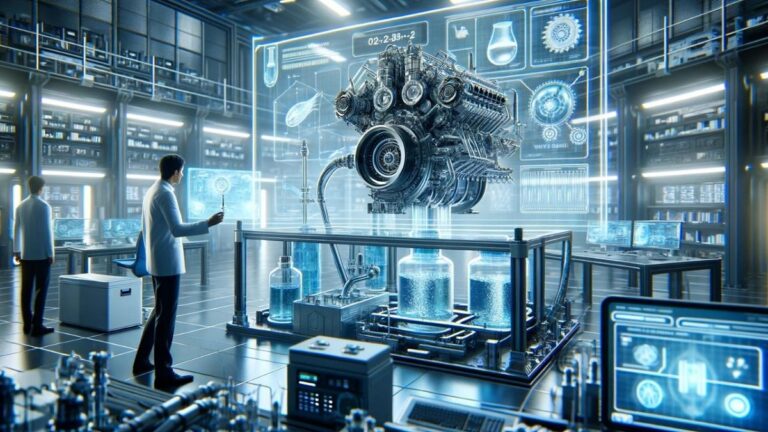For over a century, the idea of a motor that runs on water has captivated the imagination of many. From the pages of 19th-century science fiction to real-world experiments, the dream of using water as a fuel source has been a recurring theme. In Jules Verne’s The Mysterious Island (1875), he famously predicted that water would one day be harnessed as an efficient energy source, a vision that inspired many inventors and dreamers. Fast forward to the 1980s, and an American inventor named Stanley Meyer claimed to have developed a “Water Fuel Cell” that could power vehicles using just water. While his claims sparked public interest, they also raised skepticism within the scientific community, turning the water engine into both a tantalizing possibility and a contentious myth.
The Myth and Controversies Surrounding the Water Engine
Despite the excitement generated by these early claims, the concept of a water-powered engine is widely considered a myth by the majority of scientists. The fundamental problem lies in the laws of thermodynamics, which dictate that the energy required to split water into its hydrogen and oxygen components is greater than the energy that can be obtained from the process. Essentially, the idea of water being used as a primary fuel source runs into a major scientific roadblock: the energy balance just doesn’t add up.
Inventors like Meyer, who claimed to have cracked the code, were often accused of fraud or flawed methodology. Meyer, in particular, faced legal challenges, and his prototypes failed to demonstrate any practical or reliable means of producing usable energy. The criticism centers on the inefficiency of the process: extracting hydrogen from water via electrolysis requires more energy than can be recovered, making it unsustainable as a fuel source.
Still, the concept of the water engine has endured in popular culture, feeding the collective imagination and fueling interest in alternative fuels and sustainable technologies. While the dream of a water-powered engine remains largely unfulfilled, it has inspired a broader quest for solutions to our dependence on fossil fuels.
Recent Innovations in Alternative Fuels
As the urgency to reduce our reliance on fossil fuels grows, the search for alternative energy sources has led to a surge in innovation. While the water engine may remain in the realm of speculative fiction, significant strides have been made in other areas of alternative fuel technology. Hydrogen-powered vehicles, for instance, represent a promising alternative to gasoline and diesel. These vehicles run on hydrogen fuel cells, which produce electricity through a chemical reaction between hydrogen and oxygen, emitting only water vapor as a byproduct.
Investments from both companies and governments are helping build the infrastructure needed for hydrogen technology to thrive, including the establishment of specialized refueling stations. However, the production of hydrogen fuel still requires substantial amounts of energy, raising questions about its overall sustainability. If the energy needed to produce hydrogen comes from fossil fuels, the environmental benefits of hydrogen vehicles are diminished.
At the same time, electric cars, once a luxury item for the environmentally conscious, are now becoming mainstream. With advancements in battery technology, electric vehicles (EVs) are more efficient and accessible than ever before, and their adoption is accelerating. Hybrids, which combine traditional internal combustion engines with electric power, are also improving, offering consumers a balance between the old and new.
Reality vs. Fiction: Looking Toward the Future
While the notion of a water-powered engine still sparks curiosity, the scientific reality makes its practical implementation highly unlikely—at least in the near future. The energy inefficiency of water electrolysis remains a significant challenge. But that doesn’t mean the quest for alternative fuels is over. In fact, the future of energy is likely to be shaped by a multifaceted approach, combining electric, hydrogen, and hybrid technologies, rather than relying on a single solution.
One area where we are seeing significant progress is in the development of electric vehicle batteries. Innovations in battery technology have dramatically increased their efficiency, storage capacity, and longevity. Moreover, the growing use of renewable energy sources like solar and wind to produce hydrogen is helping to address the environmental impact of hydrogen production. These advances provide hope for a future where our transportation systems are less reliant on fossil fuels.
While the dream of a water-powered engine may never come to fruition, the ongoing development of alternative fuels offers a promising path forward. Whether through electric cars, hydrogen fuel cells, or hybrid technologies, we are making progress toward a cleaner, more sustainable future. The road ahead may be long, but the pursuit of cleaner energy alternatives is more urgent than ever.
In the end, while we may not be driving cars powered entirely by water anytime soon, the dream of a world less dependent on gasoline and more reliant on renewable energy sources is alive and well—driven by both innovation and the desire for a cleaner, more sustainable future.






